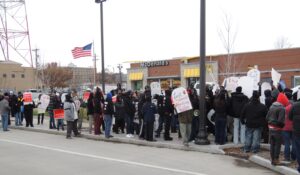
– Labor Tribune photo
By TIM ROWDEN
Associate Editor
One day after President Barack Obama declared income inequality the “defining challenge of our time,” St. Louis fast food workers, who know well the price of inequality, joined their brothers and sisters across the country in a 100-city strike wave Dec. 5, rallying for $15 an hour and the right to form a union without retaliation.
The 100-city walkout occurred one year after 200 workers in a single city – New York City – walked off their jobs to demand a living wage. Backed by labor, clergy and community allies, the movement has quickly spread around the country, with workers keeping in touch through Facebook, Low Pay Is Not OK (lowpayisnotok.org) and the websites of their various campaigns.
“It gives me great hope that we can achieve this kind of response,” said Ifama Kellin, a fast food worker in St. Louis. “We work hard every day and struggle to buy coats for our children in the winter. We will continue to talk to other workers and grow. We deserve $15 an hour and the right to form a union without retaliation, and these companies can afford to give it to us.”
Last week’s walkout targeted major national fast food restaurants including McDonald’s, Burger King, Wendy’s and KFC.
ST. LOUIS STRIKE
In St. Louis, fast-food workers from national chains across the city, community and faith groups began the day with a procession starting at a McDonald’s on Lindell Blvd.
Faith leaders and Missouri Jobs with Justice led the procession and paused at each of the fast food restaurants along the thoroughfare for speeches, songs and chants of their demand for $15 an hour and the right to form a union without retaliation.
GROWING LOW-WAGE MOVEMENT
Last week’s fast food workers walkout came on the heals of the Black Friday protests, wherein more than 100 workers and supporters were arrested as thousands of Walmart workers protested at 1,500 stores nationwide, calling for Walmart to publicly commit to paying $25,000 a year, providing full-time work and ending illegal retaliation.
Recognizing the economic urgency of helping these workers raise their wages and concerns over the two-track recovery, clergy, elected officials, and community supporters joined fast-food workers on the strike lines in cities from Seattle to Tampa.

“We are the moral voice of the religious people saying that treatment of fast food workers is not right, that multi-billion dollar companies need to pay their workers fairly,” said Rev. Martin Rafanan, community director of SHOW ME 15, formerly St. Louis Can’t Survive on $7.35,
“It’s not just about workers it’s about our communities,” Rafanan said. “We cannot continue to cover the cost of this industry that pays its workers such low wages. They need to be treated with dignity and respect in the workplace, which means that they need a voice.”
Fast food is a $200 billion a year industry, yet many service workers across the country earn minimum wage or just above it and are forced to rely on public assistance programs to provide for their families and get healthcare for their children. Nationally, the median wage for cooks, cashiers and crew at fast-food restaurants is just $8.94 an hour.
In St. Louis there are 36,000 fast-food workers. The median wage is $8.71 an hour. An adult with one child needs to make $17.45 an hour working full-time in the St. Louis area just to afford the basics, according to a model developed by a professor at MIT.
A recent report by the University of California-Berkley found more than half of front line fast food workers, including more than half of those who work more than 40 hours per week, earn so little they are forced to rely on public assistance programs, costing taxpayers $7 billion per year. Following that report, news broke that McDonald’s – the worst offender relying on taxpayers to pick up the slack for its low wages – was actually directing its workers to apply for public assistance on its McResource hotline.
MOST NEW JOBS ARE LOW-WAGE
Low-wage jobs have accounted for the bulk of new jobs added in the economic recovery, and retail and fast food are among the fastest-growing sectors, slowing the recovery and hurting local economies. A recent study from the Economic Policy Institute found that wages were flat or declined for the bottom 60 percent of workers from 2000 to 2012, even while productivity grew by 25 percent over the same period.
While median household income has risen, according to a new study by two former Census Bureau officials, it is still more than 6 percent below pre-recession levels. That loss in income has been most acute among low-wage workers, who have also seen a disproportionate drop in real wages in the recovery.
NO STEPPING STONES
Companies like McDonald’s, Burger King and Wendy’s say their low-wage jobs are stepping stones to better ones, but a report released earlier this year by the National Employment Law Project revealed managerial positions make up just 2.2 percent of all jobs in the industry.
Likewise, the industry’s claim, and popular public belief, that fast food workers are all teenagers is not backed by facts. Seventy percent of fast-food workers are in their 20s or older and more than one-quarter are raising at least one child.
BROKEN BARGAIN
In his speech last week, President Obama prodded Congress to raise wages and secure the social safety net.
“The basic bargain at the heart of our economy has frayed,” the President said.
The President vowed to focus the last three years of his presidency on addressing the discrepancy and arapidly growing deficit of opportunity that he said is a bigger threat than the fiscal deficit.
The idea that a child might never be able to climb out of poverty “should offend all of us,” Obama said. “We are a better country than this.”

